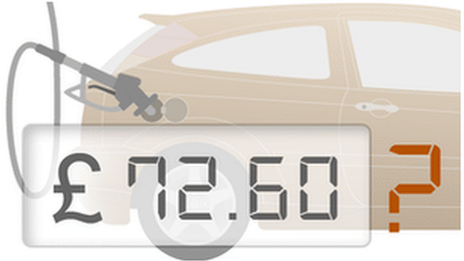OFT says UK petrol market is working well
- Published
- comments
OFT's Anne Pope: "Most of the increases are due to crude oil prices and tax and duty"
Motoring organisations have expressed disappointment after a study found drivers are paying fair fuel prices.
The Office of Fair Trading (OFT) study of the UK petrol and diesel market found that little action is needed.
"The evidence gathered by the OFT suggests that at a national level, competition is working well in the UK road fuel sector," its report, external said.
Motoring policy body the RAC Foundation said the report gave 'little comfort" to motorists.
And there were other misgivings from the Petrol Retailers' Association and pressure group Fair Fuel UK.
The OFT said there was very little evidence that petrol and diesel prices rise quickly when oil prices go up, but are slow to fall when prices drop.
"We recognise that there has been widespread mistrust in how this market is operating," said OFT chief executive Clive Maxwell.
"However, our analysis suggests that competition is working well, and rises in pump prices over last decade or so have largely been down to increases in tax and the cost of crude oil."
But the OFT found that fuel was significantly more expensive at motorway service stations and was concerned that motorists were not able to see the prices until they had left the motorway.
The report asked the Department for Transport to introduce new signs on motorways to display prices.
It also said that while it did not plan to do any more work on the national fuel market, it might still take action in some local markets if there was "persuasive evidence of anti-competitive behaviour".
Independent retailers had complained that oil companies and supermarkets had been using their scale to give themselves an unfair advantage, but the regulator found no evidence of this.
Brian Madderson from the Petrol Retailers' Association, which represents independent forecourts and made the original complaint to the OFT, said the findings were "a grave disappointment".
"This is the sort of thing that the OFT and the establishment have done many times before," he said.
Petrol Retailers' Association Brian Madderson: "This is a grave disappointment to independent retailers"
"They have failed to take on the big players in the market - the oil companies, the supermarkets - and have left the smaller independent businesses to their fate."
He questioned why wholesale petrol prices had gone up seven pence a litre since Christmas when refineries were saying they had a glut of petrol and demand had been hit by wintry weather.
'Drivers' misery'
The investigation into the £32bn sector was launched in September last year.
Since September it has been hearing evidence from trade bodies, government and regulatory organisations, consumer bodies and motoring groups.
Motorists in Plymouth say they have seen prices rise and rise
"This report will give only limited comfort to the UK's 35 million drivers who continue to pay near record prices at the pumps, but the OFT does identify the true cause of drivers' misery - the chancellor and crude oil prices," said Prof Stephen Glaister, director of the RAC Foundation.
"About 60% of the pump price is accounted for by fuel duty and VAT and we would now call on retailers to provide a breakdown on till receipts to show exactly what the proportion the Exchequer is creaming off."
"Some will find it hard to believe, but the report does make clear that the fuel market is helping keep prices lower and supermarkets have actually helped competition."
Quentin Willson, spokesman for the pressure group FairFuelUK, said he was shocked.
"Every motorist and business in Britain instinctively knows that 'something's not right'," he said.
"The OFT appears to have failed to address the key issues of : why diesel is more expensive than unleaded in the UK when this is not the case in Europe, why falls in the oil price take so long to be reflected at the pump, and why there are such variations in price, often from the same branded forecourts, within the same area."
The report was welcomed by Chris Hunt, director general of the UK's Petroleum Industry Association, which represents refiners.
"The UK has had amongst the lowest pre-tax pump prices in the EU for over a decade so the findings come as no surprise," he said.
- Published20 December 2012
- Published5 September 2012
